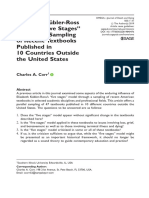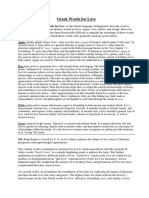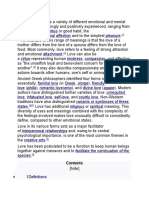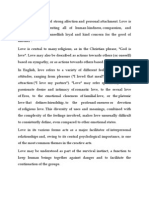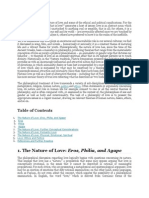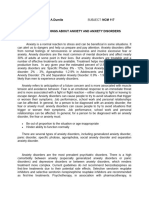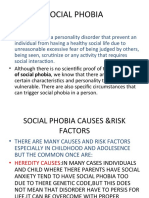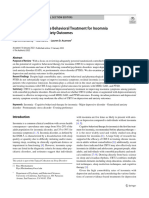Love Is A Variety of Different Feelings, States, and Attitudes That Ranges From Interpersonal
Love Is A Variety of Different Feelings, States, and Attitudes That Ranges From Interpersonal
Uploaded by
yyessmainCopyright:
Available Formats
Love Is A Variety of Different Feelings, States, and Attitudes That Ranges From Interpersonal
Love Is A Variety of Different Feelings, States, and Attitudes That Ranges From Interpersonal
Uploaded by
yyessmainOriginal Description:
Original Title
Copyright
Available Formats
Share this document
Did you find this document useful?
Is this content inappropriate?
Copyright:
Available Formats
Love Is A Variety of Different Feelings, States, and Attitudes That Ranges From Interpersonal
Love Is A Variety of Different Feelings, States, and Attitudes That Ranges From Interpersonal
Uploaded by
yyessmainCopyright:
Available Formats
Love is a variety of different feelings, states, and attitudes that ranges from interpersonal affection ("I
love my mother") to pleasure ("I loved that meal"). It can refer to an emotion of a
strong attraction and personal attachment.
[1]
It can also be a virtue representing
human kindness,compassion, and affection"the unselfish loyal and benevolent concern for the
good of another".
[2]
It may also describe compassionate and affectionate actions towards other
humans, one's self or animals.
[3]
Ancient Greeks identified four forms of love: kinship
or familiarity (in Greek, storge), friendship (philia), sexual and/or romantic desire (eros), and self-
emptying or divine love (agape).
[4][5]
Modern authors have distinguished further varieties of romantic
love.
[6]
Non-Western traditions have also distinguished variants or symbioses of these states.
[7]
This
diversity of uses and meanings combined with the complexity of the feelings involved makes love
unusually difficult to consistently define, compared to other emotional states.
Love in its various forms acts as a major facilitator of interpersonal relationships and, owing to its
central psychological importance, is one of the most common themes in the creative arts.
[8]
Love may be understood as a function to keep human beings together against menaces and
to facilitate the continuation of the species.
[9]
he word "love" can have a variety of related but distinct meanings in different contexts. Many other
languages use multiple words to express some of the different concepts that in English are denoted
as "love"; one example is the plurality of Greek words for "love". Cultural differencesin
conceptualizing love thus doubly impede the establishment of a universal definition.
[10]
Although the nature or essence of love is a subject of frequent debate, different aspects of the word
can be clarified by determining what isn'tlove (antonyms of "love"). Love as a general expression of
positive sentiment (a stronger form of like) is commonly contrasted with hate (or neutral apathy); as
a less sexual and more emotionally intimate form of romantic attachment, love is commonly
contrasted with lust; and as an interpersonal relationship with romantic overtones, love is sometimes
contrasted with friendship, although the word love is often applied to close friendships. (Further
possible ambiguities come with usages "girlfriend", "boyfriend", "just good friends").
Fraternal love (Prehispanic sculpture from 250900 AD, ofHuastec origin). Museum of
Anthropology in Xalapa, Veracruz,Mexico
Abstractly discussed love usually refers to an experience one person feels for another. Love often
involves caring for or identifying with a person or thing (cf. vulnerability and care theory of love),
including oneself (cf. narcissism). In addition to cross-cultural differences in understanding love,
ideas about love have also changed greatly over time. Some historians date modern conceptions of
romantic love to courtly Europe during or after the Middle Ages, although the prior existence of
romantic attachments is attested by ancient love poetry.
[11]
The complex and abstract nature of love often reduces discourse of love to a thought-terminating
clich. Several common proverbs regard love, from Virgil's "Love conquers all" to The Beatles' "All
You Need Is Love". St. Thomas Aquinas, following Aristotle, defines love as "to will the good of
another."
[12]
Bertrand Russell describes love as a condition of "absolute value," as opposed
to relative value.
[citation needed]
Philosopher Gottfried Leibniz said that love is "to be delighted by the
happiness of another."
[13]
Biologist Jeremy Griffith defines love as "unconditional selflessness".
[14]
Love is sometimes referred to as an "international language" that overrides cultural and linguistic
divisions.
[clarification needed]
Impersonal love
A person can be said to love an object, principle, or goal to which they are deeply committed and
greatly value. For example, compassionate outreach and volunteer workers' "love" of their cause
may sometimes be born not of interpersonal love but impersonal love, altruism, and strong spiritual
or political convictions.
[15]
People can also "love" material objects, animals, or activities if they invest
themselves in bonding or otherwise identifying with those things. If se
You might also like
- Intimate Connections - David BurnsDocument369 pagesIntimate Connections - David BurnsAlejandro Rico100% (15)
- Twin Flame Reunion Mastery Course - Kathleen CrantonDocument79 pagesTwin Flame Reunion Mastery Course - Kathleen CrantonAshique Chandan90% (20)
- Elisabeth Ku Bler-Ross and The "Five Stages" Model in A Sampling of Recent Textbooks Published in 10 Countries Outside The United StatesDocument31 pagesElisabeth Ku Bler-Ross and The "Five Stages" Model in A Sampling of Recent Textbooks Published in 10 Countries Outside The United Statesfebrian rahmatNo ratings yet
- Greek Words For LoveDocument3 pagesGreek Words For LoveMelissaNo ratings yet
- Trauma and Bonding, Franz RuppertDocument58 pagesTrauma and Bonding, Franz RuppertStela Plămadă100% (6)
- 1 Definitions: Love Is A Variety of Different Feelings, States, and AttiDocument16 pages1 Definitions: Love Is A Variety of Different Feelings, States, and AttitarunNo ratings yet
- How To Have A Better RelationshipDocument27 pagesHow To Have A Better RelationshipFabián BarbaNo ratings yet
- Emailing Language+Functions-4Document29 pagesEmailing Language+Functions-4Mohammed AbbasNo ratings yet
- Ohkjgk : Storge Philia Eros AgapeDocument2 pagesOhkjgk : Storge Philia Eros AgapeyyessmainNo ratings yet
- Ohkjgk Fasfga Agadgsdg: Storge Philia Eros AgapeDocument2 pagesOhkjgk Fasfga Agadgsdg: Storge Philia Eros AgapeyyessmainNo ratings yet
- Ohkjgk Fasfga Agadgsdg Safasf: Storge Philia Eros AgapeDocument2 pagesOhkjgk Fasfga Agadgsdg Safasf: Storge Philia Eros AgapeyyessmainNo ratings yet
- Storge Philia Eros Xenia AgapeDocument4 pagesStorge Philia Eros Xenia Agapefilan0fisteku-502158No ratings yet
- Fraternal Love (Prehispanic Sculpture From 250 - 900 A.D., of Origin) - InDocument1 pageFraternal Love (Prehispanic Sculpture From 250 - 900 A.D., of Origin) - InIpshita BanerjeeNo ratings yet
- LoveDocument2 pagesLoveCaselyn OrantesNo ratings yet
- Info AboutDocument5 pagesInfo Aboutsarkar555No ratings yet
- Navigation Search Love (Disambiguation) : From Wikipedia, The Free Encyclopedia Jump To:, For Other Uses, SeeDocument5 pagesNavigation Search Love (Disambiguation) : From Wikipedia, The Free Encyclopedia Jump To:, For Other Uses, SeeNirmaida HilalNo ratings yet
- The Word LoveDocument1 pageThe Word LoveYanriaaNo ratings yet
- Love 2 PDFDocument2 pagesLove 2 PDFdileepNo ratings yet
- Definitions: Greek Words For "Love" Cultural Differences Essence Hate Apathy Emotionally Intimate Lust FriendshipDocument2 pagesDefinitions: Greek Words For "Love" Cultural Differences Essence Hate Apathy Emotionally Intimate Lust Friendshipthehardestever bossladyNo ratings yet
- Definitions: Greek Words For "Love" Cultural Differences Essence Hate Apathy Emotionally Intimate Lust FriendshipDocument2 pagesDefinitions: Greek Words For "Love" Cultural Differences Essence Hate Apathy Emotionally Intimate Lust Friendshiptest testingNo ratings yet
- Storge Philia Eros Agape: Love Is A Variety of Different Feelings, States, and Attitudes That Ranges From InterpersonalDocument4 pagesStorge Philia Eros Agape: Love Is A Variety of Different Feelings, States, and Attitudes That Ranges From InterpersonalDana TimushNo ratings yet
- Definitions: Storge Philia Eros Xenia Agape Ren Kama Bhakti Mettā Ishq ChesedDocument3 pagesDefinitions: Storge Philia Eros Xenia Agape Ren Kama Bhakti Mettā Ishq Chesedsarkar555No ratings yet
- Definitions: Love Encompasses A Range of Strong and Positive Emotional and Mental States, From The MostDocument3 pagesDefinitions: Love Encompasses A Range of Strong and Positive Emotional and Mental States, From The Mostsarkar555No ratings yet
- Definitions: Storge Philia Eros Xenia Agape Ren Kama Bhakti Mettā Ishq ChesedDocument3 pagesDefinitions: Storge Philia Eros Xenia Agape Ren Kama Bhakti Mettā Ishq Chesedsarkar555No ratings yet
- ImpersonalDocument4 pagesImpersonalsarkar555No ratings yet
- Love - Docx DifinationDocument2 pagesLove - Docx DifinationJan NiñoNo ratings yet
- Love - Docx DifinationDocument2 pagesLove - Docx DifinationJan NiñoNo ratings yet
- Wqqweqeqeqeqwe: Love (Disambiguation)Document6 pagesWqqweqeqeqeqwe: Love (Disambiguation)Dann Francis SarnilloNo ratings yet
- Anytime You WantDocument23 pagesAnytime You WantmarcoNo ratings yet
- Interpersonal Attraction Emotion Affection Attachment Virtue Kindness CompassionDocument1 pageInterpersonal Attraction Emotion Affection Attachment Virtue Kindness CompassionNimal Jose KureekattilNo ratings yet
- Love DefinitionDocument1 pageLove DefinitionBrtuchNo ratings yet
- Definitions: Part of A Series OnDocument4 pagesDefinitions: Part of A Series OnJoey Chow C ANo ratings yet
- Essay About LoveDocument1 pageEssay About LoveJESUS is My GODNo ratings yet
- Affection Emotion Attraction Attachment Virtue Kindness CompassionDocument1 pageAffection Emotion Attraction Attachment Virtue Kindness CompassionLove_MindyLeeNo ratings yet
- 2nd HealthDocument4 pages2nd Healthtrix.gloriaNo ratings yet
- Love Encompasses A Range of Strong and Positive Emotional and Mental States, FromDocument1 pageLove Encompasses A Range of Strong and Positive Emotional and Mental States, FromJohn Paul EspirituNo ratings yet
- Affection Emotion Attraction Attachment Virtue Kindness CompassionDocument1 pageAffection Emotion Attraction Attachment Virtue Kindness CompassionSaqib GondalNo ratings yet
- Affection Emotion Attraction Attachment Virtue Kindness CompassionDocument1 pageAffection Emotion Attraction Attachment Virtue Kindness CompassionDexter LedesmaNo ratings yet
- 2nd Health 1.3Document3 pages2nd Health 1.3trix.gloriaNo ratings yet
- 2nd Health 1.3Document3 pages2nd Health 1.3trix.gloriaNo ratings yet
- Love Is A Variety of Different Feelings, States, and Attitudes That Ranges From InterpersonalDocument1 pageLove Is A Variety of Different Feelings, States, and Attitudes That Ranges From InterpersonalCristina BirladeanuNo ratings yet
- GahvjshkwuhbDocument3 pagesGahvjshkwuhbtrix.gloriaNo ratings yet
- Greek Words For "Love" Cultural DifferencesDocument6 pagesGreek Words For "Love" Cultural DifferencesChiun Er AngNo ratings yet
- Love Encompasses A Range of Strong and Positive Emotional and Mental States, From The MostDocument6 pagesLove Encompasses A Range of Strong and Positive Emotional and Mental States, From The MostHumda AuliaNo ratings yet
- Greek Words For LoveDocument3 pagesGreek Words For Love马雅兰No ratings yet
- Love Is A Variety of Different Feelings, States, and Attitudes That Ranges From InterpersonalDocument1 pageLove Is A Variety of Different Feelings, States, and Attitudes That Ranges From InterpersonalvonjovenNo ratings yet
- A Cultural Perspective On Romantic LoveDocument21 pagesA Cultural Perspective On Romantic LoveRichieQCNo ratings yet
- Definitions: Love Encompasses A Range of Strong and Positive Emotional and Mental States, From The MostDocument4 pagesDefinitions: Love Encompasses A Range of Strong and Positive Emotional and Mental States, From The MostBrandon McintoshNo ratings yet
- Definitions: Love Encompasses A Range of Strong and Positive Emotional and Mental States, From The MostDocument4 pagesDefinitions: Love Encompasses A Range of Strong and Positive Emotional and Mental States, From The MostBrandon McintoshNo ratings yet
- Love Encompasses A Variety of Strong and Positive Emotional and Mental States, Ranging From TheDocument1 pageLove Encompasses A Variety of Strong and Positive Emotional and Mental States, Ranging From TheSheila Mae AramanNo ratings yet
- On The Intellectual Discussion of LoveDocument8 pagesOn The Intellectual Discussion of LoveErwin SabornidoNo ratings yet
- Love 111Document1 pageLove 111sarkar555No ratings yet
- Love Encompasses A Range of Strong and Positive: Storge Philia Eros Xenia AgapeDocument2 pagesLove Encompasses A Range of Strong and Positive: Storge Philia Eros Xenia AgapeBicolanang MagayonNo ratings yet
- Is It LoveDocument2 pagesIs It LoveConsuela Conny PradeNo ratings yet
- LoveDocument1 pageLovesgqymccx9cNo ratings yet
- Love-WPS OfficeDocument2 pagesLove-WPS OfficemikaNo ratings yet
- Storge Philia Eros AgapeDocument2 pagesStorge Philia Eros AgapeyosephineikaaNo ratings yet
- LoveDocument1 pageLoveAmol PawarNo ratings yet
- Love Is AnDocument1 pageLove Is AnPeterOrlinoNo ratings yet
- Love Is An Emotion of Strong Affection and Personal Attachment. Love IsDocument1 pageLove Is An Emotion of Strong Affection and Personal Attachment. Love IsParth RavalNo ratings yet
- Love Is An Emotion of Strong Affection and Personal AttachmentDocument1 pageLove Is An Emotion of Strong Affection and Personal AttachmentCerry StrawberyNo ratings yet
- LoveDocument1 pageLoveMagdalis T OrNo ratings yet
- This Article Examines The Nature of Love and Some of The Ethical and Political RamificationsDocument7 pagesThis Article Examines The Nature of Love and Some of The Ethical and Political Ramificationszeeshan_nadeemNo ratings yet
- Module 2 EU112 - Different Types of Love According To The GreeksDocument7 pagesModule 2 EU112 - Different Types of Love According To The GreeksJohn Alfonso OabelNo ratings yet
- Writers on... Love (A Book of Quotes, Poems and Literary Reflections): (A Book of Quotations, Poems and Literary Reflections)From EverandWriters on... Love (A Book of Quotes, Poems and Literary Reflections): (A Book of Quotations, Poems and Literary Reflections)No ratings yet
- Subject of A VerbDocument2 pagesSubject of A VerbyyessmainNo ratings yet
- Document 2Document2 pagesDocument 2yyessmainNo ratings yet
- Sti Colleges: Prostat (Probability and Statistics)Document2 pagesSti Colleges: Prostat (Probability and Statistics)yyessmainNo ratings yet
- AdfasdfDocument1 pageAdfasdfyyessmainNo ratings yet
- Herbs and SpicesDocument7 pagesHerbs and SpicesyyessmainNo ratings yet
- Prachi Singh (Question Paper Solving)Document8 pagesPrachi Singh (Question Paper Solving)Shriyanchi ResearchNo ratings yet
- Daftar Pustaka: Universitas Kristen MaranathaDocument3 pagesDaftar Pustaka: Universitas Kristen MaranathaGoyohzAliemzNo ratings yet
- Assignment NCM 117 (Readings)Document17 pagesAssignment NCM 117 (Readings)Ayessa Camelle DumileNo ratings yet
- Hopkins Symptoms ChecklistDocument2 pagesHopkins Symptoms ChecklistLoki DopeNo ratings yet
- Assignment 1editedDocument9 pagesAssignment 1editedAlamandha Madhan KumarNo ratings yet
- Limerence - Dangerous or Not?Document2 pagesLimerence - Dangerous or Not?Clear SkiesNo ratings yet
- Lets Talk About VirginityDocument4 pagesLets Talk About Virginityapi-274613660No ratings yet
- Anxiety BibliographyDocument2 pagesAnxiety BibliographyEmanuela Pascari0% (1)
- Types of Anxiety DisordersDocument5 pagesTypes of Anxiety DisordersCindy Mae de la TorreNo ratings yet
- LCM Module 1Document5 pagesLCM Module 1ronjay julianNo ratings yet
- Shellshocked History PresentationDocument13 pagesShellshocked History Presentation•Joane.k•No ratings yet
- Extra Marital Affair and Family Discord (Vol. 2, No. 2) 2013Document10 pagesExtra Marital Affair and Family Discord (Vol. 2, No. 2) 2013International Journal of Islamic Thoughts (IJITs)No ratings yet
- Anxiety The Omni Present in 21 CenturyDocument17 pagesAnxiety The Omni Present in 21 CenturyYaadrahulkumar MoharanaNo ratings yet
- Faml 300 Document The Marriage CompasDocument72 pagesFaml 300 Document The Marriage CompasNelsonNo ratings yet
- The Seven Types of LoveDocument18 pagesThe Seven Types of LoveJayamina JpNo ratings yet
- VU - Depression Case ReportDocument21 pagesVU - Depression Case Reportaq331560No ratings yet
- Anorexia Masochism Self-Mutilation Autoerotism - The Spider MotherDocument24 pagesAnorexia Masochism Self-Mutilation Autoerotism - The Spider MotherLuis Alfredo Padilla SandovalNo ratings yet
- Apsq EnglishDocument2 pagesApsq EnglishoshiamackayNo ratings yet
- Lesson 8 Human Person As Oriented Towards Their Impending DeathDocument20 pagesLesson 8 Human Person As Oriented Towards Their Impending DeathDaniel Prudenciado100% (2)
- Social PhobiaDocument11 pagesSocial Phobiakaran_rocks_world709No ratings yet
- Possible Drawbacks of NarcissismDocument2 pagesPossible Drawbacks of NarcissismTry HardNo ratings yet
- Script (Hierarchy of Needs)Document5 pagesScript (Hierarchy of Needs)Jean EscoletaNo ratings yet
- Moderators of Cognitive Behavioral Treatment For Insomnia On Depression and Anxiety OutcomesDocument8 pagesModerators of Cognitive Behavioral Treatment For Insomnia On Depression and Anxiety Outcomesharel.eveNo ratings yet
- Inside Out 7moDocument20 pagesInside Out 7moRodrigo Muñoz ContrerasNo ratings yet


